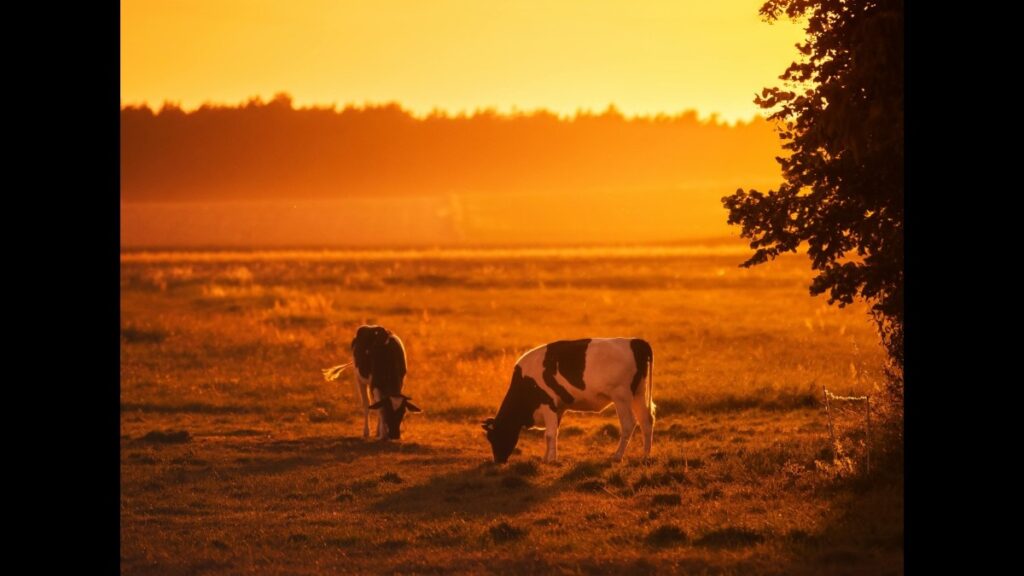As temperatures soar during the Indian summer, dairy farmers face the challenge of protecting their cows from heat stress, which impacts health, well-being, and milk production. Explore different strategies to help cows beat the heat, including providing adequate shade and shelter with heat-reflective materials, ensuring proper ventilation with fans and open windows, and maintaining continuous access to fresh water. Adjusting feeding practices to cooler times of the day and increasing green fodder can also help.
As temperatures soar during the summer, dairy farmers face the critical challenge of protecting their cows from heat stress. Heat stress not only affects the health and well-being of cows but also impacts milk production and overall farm productivity. Implementing effective strategies to help cows beat the heat is essential.
Here are some key practices tailored for dairy farms.
Shade and Shelter
Providing adequate shade and shelter is the first line of defense against heat stress. In India, steel sheets are commonly used for shelter, but they tend to heat up quickly, creating an unbearable environment for milking animals. Instead, using cement sheets or other heat-reflective materials for shelter can significantly reduce heat buildup.
- Cement Sheets: These materials are effective in preventing roofs from heating excessively, thereby creating a cooler environment underneath.
- Natural Shade: Planting trees or installing shade nets can also provide additional shade, reducing direct exposure to the sun.
Proper Ventilation
Optimising airflow is critical to preventing heat buildup in shelters. Ensuring that barns or housing facilities are well-ventilated is paramount. Good air circulation plays a pivotal role in dissipating heat and creating a more comfortable environment for cows.
- Fans: Installing fans can help improve air circulation within shelters.
- Ventilation Systems: Implementing efficient ventilation systems that facilitate the continuous movement of air can be particularly effective.
Access to Fresh Water
Ensuring cows stay well-hydrated is essential in battling heat stress during scorching temperatures. Guaranteeing continuous access to clean, cool drinking water is imperative.
- Water Availability: Ensure that water troughs are filled with fresh, cool water at all times.
- Frequent Refills: Regularly refill and clean water troughs to maintain water quality.
- Additional Water Sources: Consider adding more water stations around the farm to reduce the distance cows need to travel to drink.
Adjusting Feeding Practices
Adapting feeding practices during summer is crucial to minimize heat stress. Scheduling feeding times during cooler periods, such as early mornings or late evenings, can help.
- Feeding Times: Shift feeding schedules to cooler parts of the day to reduce the metabolic heat generated during digestion.
- Green Fodder: Increase the percentage of green fodder in the cows’ diet, as it contains higher moisture content and helps in keeping cows hydrated.
- Balanced Diet: Ensure that the diet is well-balanced with adequate nutrients to maintain health and productivity during the heat.
Cooling Systems
Installing cooling systems can be an effective way to reduce heat stress in cows.
- Sprinklers: Use sprinklers or misting systems to cool cows directly by spraying them with water at intervals.
- Evaporative Coolers: These systems use the evaporation of water to cool the air, providing a cooler environment for the cows.
Adjusting Work Schedules
To minimize the impact of heat on both cows and farm workers, adjusting work schedules can be beneficial.
- Early Morning or Late Evening: Conduct activities such as milking, feeding, and cleaning during the cooler parts of the day.
- Rest Periods: Ensure cows have sufficient rest periods during the hottest hours to reduce heat stress.
Monitoring and Health Checks
Regular monitoring and health checks can help identify and address heat stress early.
- Temperature Checks: Regularly check the body temperature of cows to monitor for signs of heat stress.
- Behavioral Monitoring: Observe cows for signs of heat stress, such as excessive panting, reduced feed intake, and lethargy.
- Veterinary Support: Have a veterinarian on call to address any health issues arising from heat stress promptly.
Implementing heat stress mitigating strategies can significantly reduce heat stress in cows, enhancing their comfort and productivity during the harsh summers. By providing proper shade and shelter, ensuring good ventilation, maintaining access to fresh water, adjusting feeding practices, installing cooling systems, adjusting work schedules, monitoring health, and considering heat-resistant breeds, dairy farmers can create a healthier and more comfortable environment for their cows. This, in turn, can lead to better milk production and overall farm success.
Protecting cows from heat stress is not just about immediate comfort; it’s about ensuring long-term health and productivity, which are vital for the sustainability of dairy farming in India.
